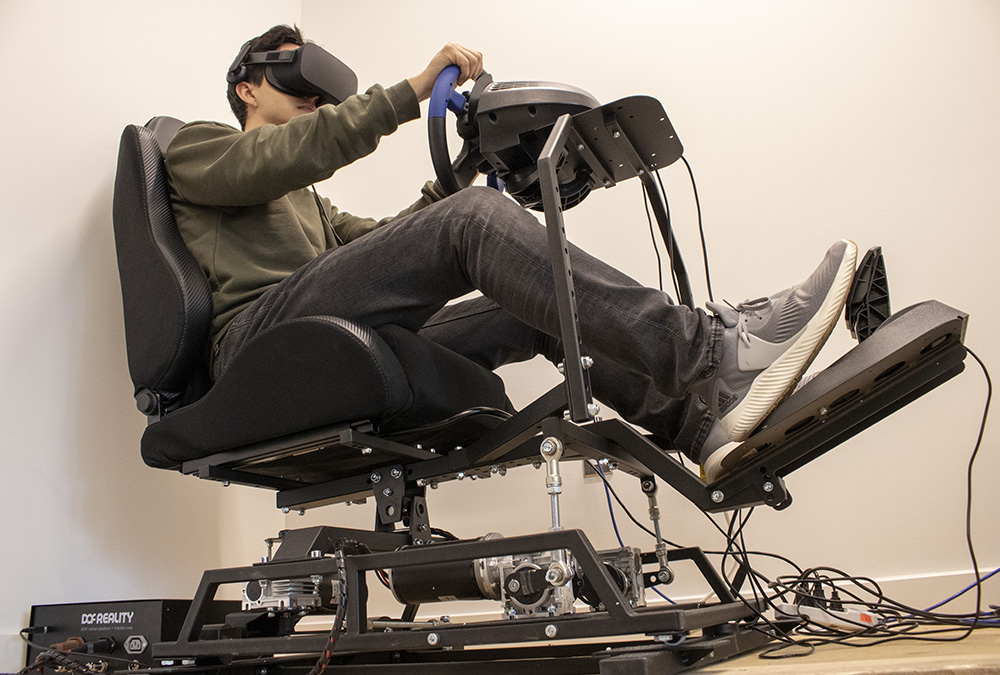Fields of Study

Our fields of study are designed with this key aim in mind: innovation through specialization. Expertise is incredibly valuable in industry today, and by focusing your talents and efforts towards what you are passionate about, our program will prepare you to solve the most pressing problems in civil engineering and beyond, and make your own research breakthroughs. We’ll give you the tools, facilities, mentors and access to industry opportunities you need. The ideas and vision are yours.

“The Toronto Metropolitan University curriculum and community provided me with more than just the skillset required to excel in my industry. It gave me the social integrity needed to stand out as an emerging professional.”
Maria Espinosa Granados, Transportation Engineering Trainee (EIT) at CIMA+
Civil Engineering ‘15
Civil Engineering (MASc) ‘17
Four Fields of Study to Choose From
The field of environmental engineering covers urban facilities, infrastructure and environment, environmental informatics, and urban water and waste systems. Studies in environmental geomatics technologies is also offered, such as environmental remote sensing and geographic information systems (GIS)–based environmental decision support systems, monitoring, modelling and optimization of innovative stormwater management techniques.
Career opportunities abound with a variety of leading Canadian and international engineering firms such as WSP Global Inc., AECOM, Stantec, as well as municipalities and government agencies, including the City of Toronto, Environment Canada, and the Ontario Ministry of the Environment, Conservation & Parks. The skills you acquire can also be applied to areas outside of engineering, such as land development and municipal infrastructure planning and management.
Research Areas:
- Anaerobic digestion
- Biogas production
- Bioaccumulations of toxins in aquatic space
- Eco-hydrology and eco-hydraulic engineering
- Green engineering
- Industrial oil/chemical spill management
- Innovative wastewater treatment technologies
- Modelling of watershed and landfill design
- Resources recovery from wastes
- Urban stormwater management practices
- Urban water and waste systems
Research Laboratories and Facilities:
Geomatics engineering research includes the areas of geospatial information and geographic information systems (GIS), photogrammetry and digital mapping, remote sensing and image processing, as well as satellite positioning and navigation. New, emerging directions include mobile mapping, geospatial cloud computing, knowledge discovery, light detection and ranging (LiDAR), and innovative geomatics applications.
As a graduate of this field of study, you will be qualified for employment with a variety of leading Canadian and international geomatics engineering firms such as PCI Geomatics, Teledyne Optech, and ESRI Canada, as well as municipalities and government agencies, including the City of Toronto, Ontario Ministry of Transportation, Ontario Ministry of Environment, and Natural Resources Canada. The skills you acquire can also be applied to areas outside of engineering such as urban planning, defense and natural resource management.
Research Areas:
- 3D/4D city modeling, building information management and visualization
- Big geospatial data analytics for smart cities
- Multi-sensor integration for mobile mapping and intelligent transportation systems
- Photogrammetry, 3D imaging, deformation monitoring and metrology
- Real-time and collaborative geographical information systems
- Remote sensing and image processing (e.g., automated object extraction and LiDAR data processing)
- Satellite positioning and navigation
- UAV sensor integration and real-time mapping
Research Laboratories and Facilities:
This field focuses on the various means for dealing with deteriorating built infrastructure, including earthquake engineering, construction materials and pavements, geotechnical engineering, and construction project management.
As a graduate of this field of study, a world of employment opportunities awaits with a variety of leading Canadian and international engineering firms such as CIMA+, LafargeHolcim, King Package Materials, Metrolinx, AECON, HATCH Group, Stantec, Dessau, EllisDon, Genivar, Golder, Morrison Hershfield, PCL Construction, SNC-Lavalin and WorleyParsons, and municipalities and government agencies, including the City of Toronto, Region of Peel, Environment Canada, NRC, as well as various positions in academia. The skills you acquire can also be applied to areas outside of engineering such as higher management, architectural and computer sciences, urban planning, law and policies, aerospace, and forensic sciences.
Research Areas:
- Aggregate reactions such as oxidation of sulphide minerals and alkali-aggregate reactions
- Applications of advanced composite materials in bridges and structures
- Behavior of structures and properties of concrete materials
- Bridge design, construction, repair and rehabilitation
- Deterioration and rehabilitation of infrastructures
- Earthquake-resistant steel buildings with self-centring systems and materials
- Evaluation and development of test methods for concrete durability in harsh environments
- High-strength/performance concrete and reactive powder concrete
- Offshore structures
- Performance-based design of concrete liquid containing structures, including liquid-structure-soil interaction effects
- Response of structures to wind actions using experimental wind tunnel testing and computational fluid dynamics
- Seismic analysis, design, and performance-based assessment of structures
- Strength of steel and composite concrete-steel members
- Structural health monitoring
- Sustainable development of self-consolidating concrete
- Tall building and long-span bridge aerodynamics
- Thunderstorm wind speeds suitable for structural design
- Use of industrial by-products in concrete and asphalt
Research Laboratories and Facilities:
Graduate studies in this field involves research in road safety, highway design, urban transportation systems, planning, design and management of transportation systems with emphasis on our road and transit infrastructure.
As a graduate of this field of study, you will be qualified for jobs with leading Canadian companies, municipalities and government agencies such as WSP, CIMA+, TTC, the City of Toronto, Peel Region, York Region, and the Ministry of Transportation. The skills you acquire can also be applied to areas outside of engineering such as project planning and business management.
Research Areas:
- Disruptive/transformative transportation technologies and services
- Highway design
- Intelligent transportation systems
- Road safety and human factors
- Traffic operations/control/management
- Transportation planning
- Travel demand and behavior
- Transportation informatics
Research Laboratories and Facilities:
Additional Areas of Specialization to Study (with limited course offerings and resources)
We also offer a limited number of courses within the following research areas:
A burgeoning field for research and practise, construction and infrastructure management focuses on the managerial aspects of issues arising during infrastructure planning, design, construction, operation and maintenance from a systematic viewpoint. As a construction and infrastructure management researcher, you will conduct multidisciplinary research across other areas of the department. By integrating systems thinking, project management skills, modelling and simulation, data analytics, risk and uncertainties, optimization, and decision making theories, you will strive to provide holistic solutions for effective delivery and management of infrastructure systems.
As a graduate of this field of study, a world of employment opportunities awaits with a variety of leading Canadian and international engineering firms such as Ellis Don, PCL, and SNC Lavalin, as well as municipalities and government agencies, including the City of Toronto, Metrolinx, and Infrastructure Ontario. The project management skills you acquire can also be applied to all engineering areas and beyond.
Research Areas:
- Competitive bidding
- Construction innovation
- Infrastructure asset management
- Public-private partnerships
- Risk, reliability and resilience
- System optimization
Geotechnical engineering focuses directly on the engineering behaviour of earth materials. This discipline applies the knowledge of soil mechanics and rock mechanics to the design of foundations, tunnels, retaining walls, earth dams, etc.
As a graduate of this field of study, a world of employment opportunities awaits with a variety of leading Canadian and international engineering firms such as Keller Foundations Ltd, WSP, and Arup, as well as municipalities and government agencies, including the City of Toronto, Environment Canada, and the Ministry of Transportation. The skills you acquire can also be applied to areas outside of engineering such as real estate development and facilities management.
Research Areas:
- Reliability design of geo-structures
- Ground improvement techniques
- Geotechnical characteristics of glacial deposits
- Design and risk mitigations of urban tunneling